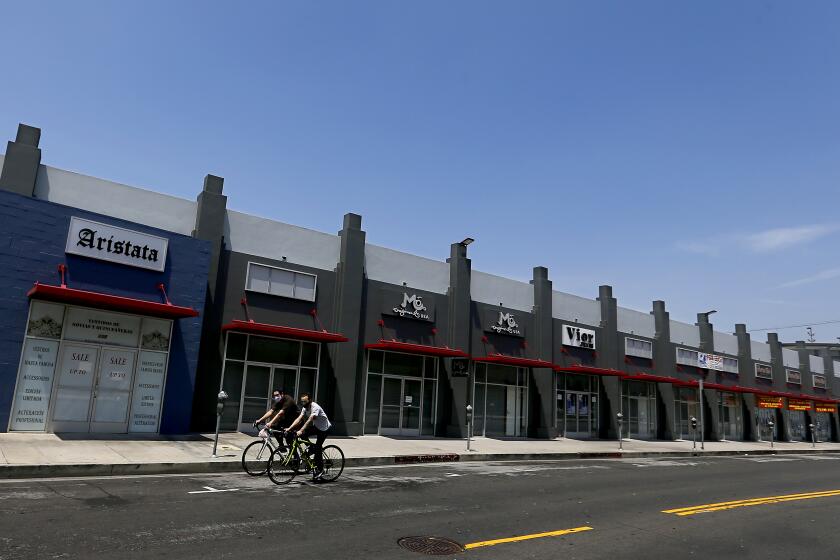‘A tracing army’: As they reopen, states look to contact tracers in COVID-19 fight
With governors around the nation lifting stay-at-home orders implemented to slow the spread of coronavirus, many are now seeking new combatants: contact tracers.
These hired public health officials work with patients to help them recall everyone they had close contact with during the time when they were most infectious. It’s no easy task.
On Thursday, New York Gov. Andrew Cuomo said that about three dozen contact tracers would be needed for every 100,000 people in affected areas. He estimated New York would need between 6,400 and 70,000 contract tracers, depending on the outcome of projected cases.
“It’s not rocket science to do it on an individual basis. The problem is the scale that we have to do this at,” Cuomo, a Democrat, said during a news conference in Albany.
“It will require, under any estimate, a tracing army to come up to scale very, very quickly,” Cuomo said.
New York state has remained a hotbed of the coronavirus outbreak, with 305,000 cases and more than 23,300 deaths. The state’s stay-at-home requirement is set to expire on May 15, but could be extended.
California officials still have a lot to do before they can meet the benchmarks that Gov. Gavin Newsom set to reopen the economy and lift restrictions on daily life.
Cuomo said next week the New York City Metropolitan Transportation Authority would halt service from 1 a.m. to 5 a.m. to disinfect trains. The subway system normally runs 24 hours, with service only halted during emergencies.
Nationwide, the death toll from COVID-19 approached 63,000 on Thursday, and the number of confirmed cases has surpassed 1 million, according to Johns Hopkins University.
With little support from the federal government — White House guidelines suggests that states conduct contact tracing themselves — the effort has fallen on governors and locals leaders to implement as they reopen. By Friday, over 30 states will have lifted stay-at-home orders to some extent.
Earlier this month, Massachusetts Gov. Charlie Baker, a Republican, announced an effort to set aside $44 million for contact tracing. Washington’s Democratic Gov. Jay Inslee has said his state plans to recruit and train roughly 1,900 contact tracers by mid-May. The Seattle area was among the first virus hot spots in the country.
In Indiana, officials announced a program this week that includes having 500 trained contact tracers in place in the weeks ahead.
“As we fight the spread of COVID-19, we need the ability to rapidly contact positive patients and their close contacts to determine who else might have been exposed,” Indiana’s Republican Gov. Eric Holcomb said. “Centralizing this work will allow us to quickly identify individuals who need to be quarantined, reduce the risk of additional infections and take actions to ensure our schools, workplaces and public settings are safe.”
On Thursday, several states — Idaho, Pennsylvania, Texas, to name a few — have stay-at-home orders that will expire. Still, most businesses in those states will have limited capacities.
But some states are expanding orders and current orders are receiving strong push-back.
Protesters in Michigan marched through the state Capitol in Lansing against a stay-at-home order that, in recent days, was extended by Democratic Gov. Gretchen Whitmer until mid-May. Some carried firearms, which are allowed under state law inside the Capitol building. Earlier this month, several hundred marched outside.
Black communities in the state, primarily in Detroit, have seen high rates of infections and death due to, among other things, a lack of quality healthcare and inequities in housing.
In Minnesota, Gov. Tim Walz extended a stay-at-home order until May 18 that was supposed to expire next week.
“We are on a very fine line with this virus that can come very, very quickly,” said Walz, a Democrat. “It won’t be a slow burn. It will be exponential growth.”
His state has seen 5,100 cases of the virus and 350 deaths.
More than 200 workers at the JBS plant in rural Minnesota tested positive for coronavirus earlier this week, according to the Minnesota Department of Health. Several meatpacking plants have shuttered nationwide in recent weeks due to workers contracting the virus.
This week President Trump signed an executive order invoking the Defense Production Act to keep meatpacking plants in the U.S. open during the pandemic.
On Thursday, Trump met with New Jersey Gov. Phil Murphy, a Democrat, at the White House. He’s the third governor to meet with Trump this week, following Louisiana Gov. John Bel Edwards, also a Democrat, and Florida Gov. Ron DeSantis, a Republican. Murphy announced he will reopen all state parks and golf courses on Saturday. He said social distancing will still be required for the foreseeable future.
“The curves, thank God, are beginning to show promise,” Murphy said in his Oval Office meeting. “And we’re beginning to take some baby steps on that road to reopening.”
More to Read
Sign up for Essential California
The most important California stories and recommendations in your inbox every morning.
You may occasionally receive promotional content from the Los Angeles Times.











